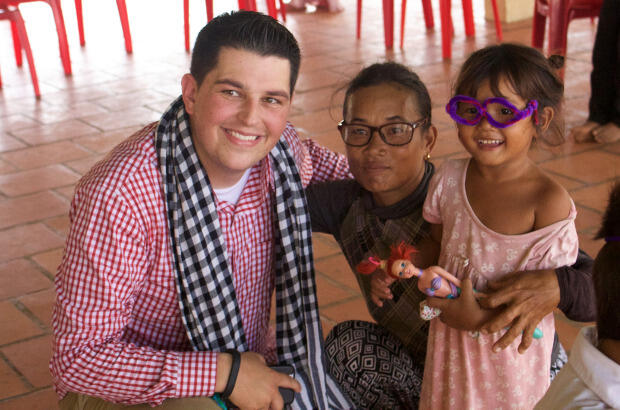
Sept. 1, 2016
Trammell Cox has a vision: to help others see.
Cox’s nonprofit organization, Seeing is Believing, gives people the power of sight
Share this story
While studying at the Virginia Commonwealth University School of Medicine — and serving as president of the Class of 2018 — Cox runs a nonprofit organization that helps provide eyeglasses for patients overseas.
The organization, Seeing is Believing, began on a small scale with a few pairs of reading glasses. Six years and more than 19,000 pairs of glasses later, it’s still going strong, as Cox returned to Southeast Asia in August to continue what he started as a missionary for The Church of Jesus Christ of Latter-day Saints in 2008.
As he was teaching in Cambodia on that mission trip, he realized that some students weren’t participating.
“Often we’d ask people to read but they’d say they couldn’t,” said Cox. “For a while we assumed that it was that they never learned to read. But as we probed a little bit, we found out it was because they couldn’t see.”

Cox and colleagues went out and purchased reading glasses for many people. At about $1 a pair, it didn’t seem too daunting. But then he realized how many people needed them.
On one of his twice-yearly calls home, Cox described the situation to his younger brother, Parker. When Cox’s family came to see him in Cambodia, they delivered cash and donated eyeglasses that Parker had collected as part of his Eagle Scout project.
For about $100, the brothers conducted vision screenings and provided eyewear to children in an orphanage.
After returning home in 2010, Cox, his wife, Jen, and his brother founded Seeing is Believing. At least once a year, they go back to help some of the world’s poorest people.
“The majority of people in Cambodia live day-to-day, using the money they earn throughout the day to buy dinner for the family at night,” Cox says. “As a result, many can’t save enough money for a simple pair of prescription glasses.”
Poverty is rampant in Cambodia, which still struggles with aftereffects of dictator Pol Pot’s genocide and policies. Cox notes that Pol Pot directed the killing of any intellectuals he deemed a threat to his organization. Eyeglasses became a symbol of intelligence, and those who wore them were targeted by the Khmer Rouge regime.
Cox, who is fluent in Cambodian, has established a network to support the nonprofit.
“Through our connections, we identify those with the greatest need, and those who can benefit the most,” he said. “We then work with the Cambodian optometrists to screen them. Rather than undermine the local Cambodian market, we support and encourage economic growth by relying on the optometrists to make the prescription glasses, which we buy from them.
“We can provide those in need with an eye screening and brand new pair of prescription glasses for about $5 a pair.”
Cox said his School of Medicine classmates and faculty have been supportive, and many have donated to Seeing is Believing. His enthusiasm and generosity have made an impression, said Lelia Brinegar, Ed.D., assistant dean for curriculum.
“When I think of Trammell, some of the first words that come to mind are supportive, encouraging and friendly,” Brinegar said. “He is the first person to step forward when a request for volunteers is announced.”
We’re giving glasses and sight, but also vision.
Cox visited Cambodia and neighboring Laos in August before returning to VCU's MCV Campus for his third-year of medical school. He isn’t sure what type of medicine he’ll practice when he graduates; while ophthalmology is a possibility, he’s still considering his options.
But he’ll definitely continue to help others see.
“We chose the name Seeing is Believing because it has such a positive connotation,” Cox said. “That’s the effect we believe sight can have. We’re giving glasses and sight, but also vision.”
Subscribe for free to the weekly VCU News email newsletter at http://newsletter.news.vcu.edu/ and receive a selection of stories, videos, photos, news clips and event listings in your inbox every Thursday.
Subscribe to VCU News
Subscribe to VCU News at newsletter.vcu.edu and receive a selection of stories, videos, photos, news clips and event listings in your inbox.













